The importance of recycling cannot be overstated when considering the intricate web of environmental impacts and resource management. As we navigate the complexities of modern waste disposal and sustainability practices, understanding the role of recycling emerges as a crucial component in mitigating ecological harm and promoting a more efficient use of resources. Through a scientific lens, the rationale behind recycling reveals a compelling narrative of interconnected systems and consequences that demand our attention and action.
Key Takeaways
- Recycling conserves resources, reduces waste, and lowers greenhouse gas emissions.
- It plays a vital role in sustainable resource management and environmental preservation.
- Recycling saves energy, decreases pollution, and supports a greener future.
- By recycling, we contribute to a circular economy, innovation, and global sustainability goals.
Environmental Impact of Recycling
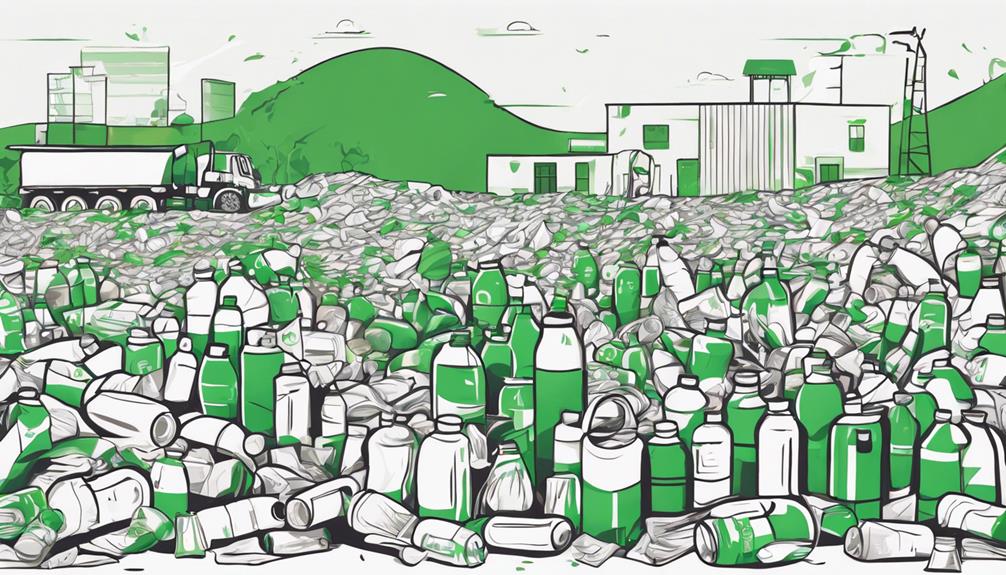
Recycling plays a crucial role in mitigating environmental damage by reducing waste sent to landfills and incinerators, thus safeguarding ecosystems and wildlife. One significant environmental impact of recycling is its ability to reduce the need for new raw materials, thereby decreasing the extraction and processing of resources like timber, water, and minerals. This conservation of natural resources is essential for maintaining ecological balance and sustainability.
Furthermore, recycling contributes to lowering greenhouse gas emissions and combating climate change. By reusing materials instead of producing them from scratch, recycling helps decrease carbon emissions associated with manufacturing processes. This reduction in greenhouse gases is vital for mitigating the effects of global warming and promoting a healthier environment for all living organisms.
Resource Conservation Through Recycling
Recycling plays a crucial role in resource conservation by reducing the demand for raw materials. It helps mitigate the environmental impact of resource extraction and production processes. By recycling, we contribute to waste reduction efforts and promote sustainability for the future.
Waste Reduction Benefits
Through the process of recycling, significant waste reduction benefits are achieved, particularly in resource conservation. By reusing recycled materials, the amount of waste sent to landfills decreases, alleviating the strain on waste management systems. This reduction in waste accumulation also helps conserve energy, as recycling typically requires less energy compared to producing new materials from raw resources. Moreover, the conservation of resources through recycling plays a crucial role in mitigating environmental degradation. By lowering the demand for new materials, recycling contributes to the preservation of ecosystems and communities that would otherwise be affected by resource extraction. Overall, waste reduction benefits achieved through recycling have a profound impact on energy conservation and the sustainable management of resources.
Environmental Impact Mitigation
In the context of waste reduction benefits and the imperative of resource conservation, the practice of recycling emerges as a pivotal mechanism for environmental impact mitigation. By incorporating recycled materials into production processes, several key benefits are realized:
- Reduce the Need: Recycling helps lower the necessity for extracting raw materials, thereby preserving natural resources and habitats.
- Save Energy: The use of recycled materials in manufacturing processes leads to decreased energy consumption, promoting energy efficiency.
- Preserve Resources: By reducing solid waste accumulation, recycling aids in conserving scarce resources and minimizing environmental degradation.
- Protect Ecosystems: Decreasing the demand for new materials through recycling plays a vital role in safeguarding ecosystems and wildlife.
Common Recycling Myths Debunked
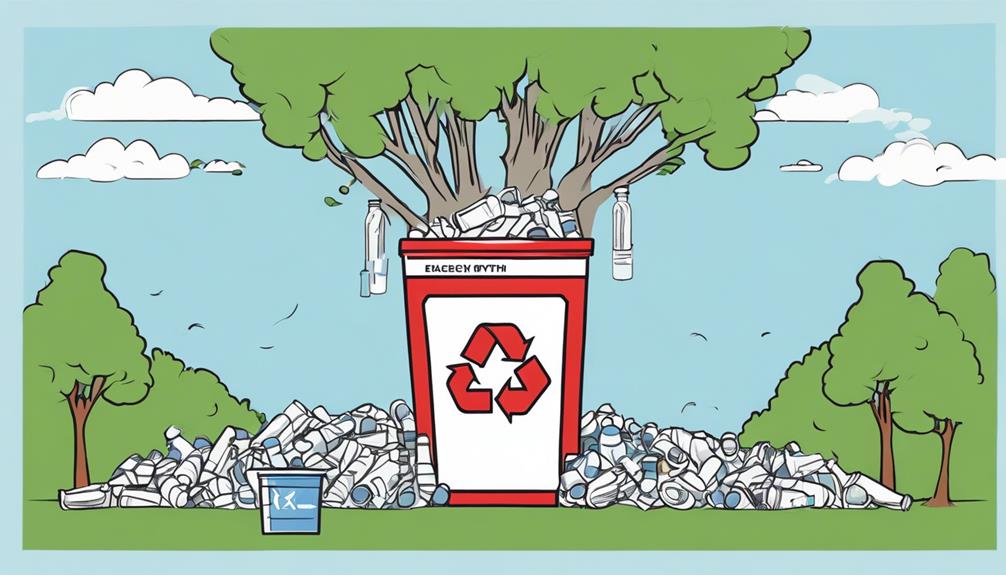
Misconceptions and falsehoods surrounding the recycling process continue to persist despite advancements in waste management and resource recovery technologies. One common myth is the belief that recycled materials are simply discarded rather than being transformed into new products. In reality, recycling facilities process these materials to make new items, reducing the need for virgin resources and lessening environmental impact. Another prevalent misconception is that minimal waste means food waste collection is unnecessary for effective recycling practices. However, proper food waste disposal is vital for composting and energy generation. Additionally, the idea that paper can only be recycled a few times before becoming unusable is inaccurate. Paper fibers can be recycled multiple times before being repurposed into various paper products. Moreover, recycling metal consumes significantly less energy than extracting raw materials, contributing to energy conservation efforts. Debunking these recycling myths is crucial for promoting accurate information and encouraging sustainable recycling practices.
Benefits of Recycling for the Environment
Recycling offers a multitude of environmental benefits, playing a vital role in reducing waste and conserving resources for a sustainable future. Here are some key ways recycling benefits the environment:
- Reduction of Waste: Recycling reduces the amount of waste sent to landfills and incinerators, which helps protect ecosystems and wildlife.
- Conservation of Natural Resources: By conserving natural resources through recycling, we can lower carbon emissions, reduce the need to harvest new materials, and decrease the strain on ecosystems.
- Energy Savings: Recycling not only saves energy but also contributes to overall energy efficiency efforts. This reduction in energy consumption helps in the conservation of resources and fosters sustainable practices.
- Material Reuse: Through recycling, materials like paper can be reused, leading to the preservation of forests and trees. This process also decreases our reliance on fossil fuels and raw materials, further benefiting the environment.
Recycling and Energy Consumption
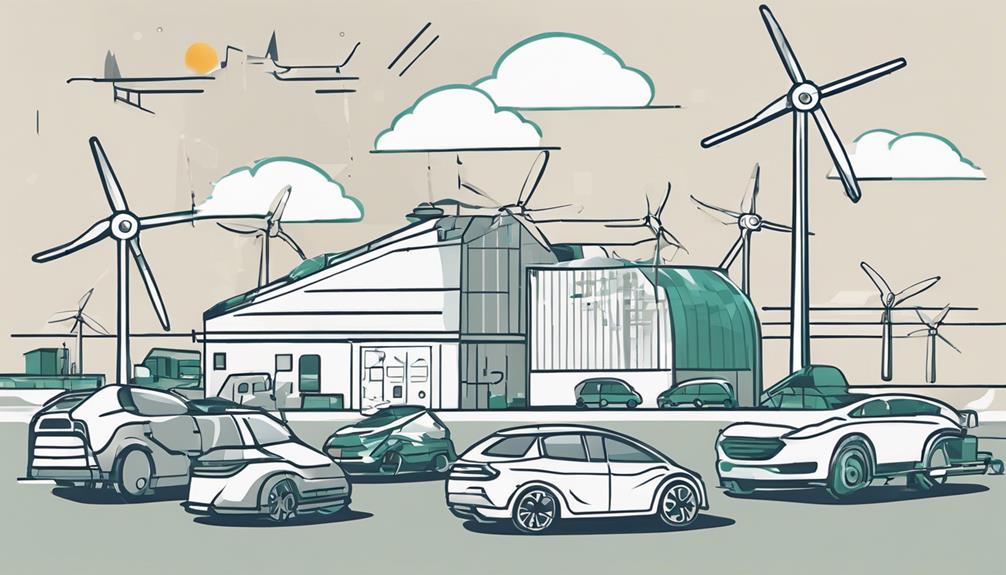
Recycling plays a crucial role in conserving energy resources by significantly reducing the energy required to produce goods. The process of recycling materials like aluminum leads to substantial energy savings, with up to 95% less energy needed compared to using raw materials. By promoting the use of recycled materials, society can minimize energy consumption, contribute to environmental sustainability, and support energy conservation efforts.
Energy Savings Through Recycling
Energy conservation through recycling processes plays a crucial role in reducing overall energy consumption and environmental impact. When considering energy savings through recycling, the benefits are substantial:
- Recycling aluminum saves up to 95% of the energy needed to produce new aluminum from raw materials.
- Producing items from recycled materials consumes less energy compared to manufacturing from scratch.
- Recycling paper saves significant energy, reducing the demand for raw materials like timber.
- Efficient recycling processes play a key role in conserving resources and reducing energy usage.
These points highlight how recycling not only helps in the conservation of resources but also contributes significantly to energy savings and environmental sustainability.
Reduced Resource Consumption
Reduced resource consumption through sustainable practices is a critical component of enhancing environmental stewardship and promoting long-term ecological balance. Recycling plays a vital role in this by significantly decreasing energy consumption. For instance, recycling aluminum saves up to 95% of the energy required to produce new aluminum from raw materials. Similarly, paper recycling conserves substantial energy and water compared to manufacturing paper from virgin sources. Glass recycling reduces energy usage by up to 30% and minimizes air pollution associated with glass production. Plastic recycling also contributes to energy conservation by preserving oil and natural gas resources used in plastic manufacturing. Overall, recycling helps conserve resources and substantially reduces energy consumption, making it a key strategy for sustainable resource management.
Environmental Benefits of Recycling
Through sustainable practices like recycling, the conservation of energy resources becomes a fundamental aspect of environmental stewardship, ensuring a balanced ecological future.
Environmental Benefits of Recycling:
- Recycling aluminum saves 95% of the energy required to produce new aluminum from raw materials.
- Paper recycling conserves forests and reduces reliance on fossil fuels for paper production.
- Recycling helps in lowering overall energy consumption and contributes to energy efficiency efforts.
- Conserving natural resources through recycling reduces the need to harvest new materials.
Importance of Recycling Paper
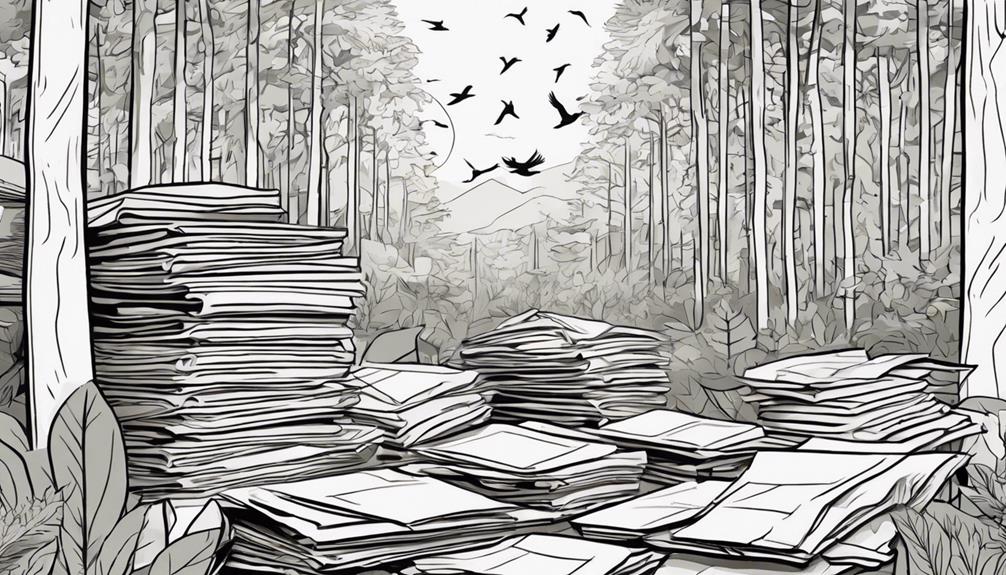
The significance of recycling paper lies in its substantial environmental benefits and resource conservation impact. Recycling one ton of paper, such as recycled newspaper, can save 17 trees, 7,000 gallons of water, 3 cubic yards of landfill space, and 4,100 kilowatt-hours of energy. The process of producing recycled paper consumes 40% less energy compared to paper made from virgin wood pulp, contributing significantly to energy conservation efforts. Moreover, paper fibers can be recycled 5-7 times before becoming too short for high-quality paper production, maximizing resource utilization.
In addition to energy conservation, recycling paper plays a crucial role in reducing air and water pollution. The paper recycling process decreases air pollution by 74% and water pollution by 35% in comparison to producing paper from raw materials. This reduction in pollution levels contributes to a cleaner and healthier environment. Overall, the conservation of energy and reduction in air and water pollution through paper recycling demonstrate its importance in promoting environmental sustainability.
Recycling Metals for Sustainability
Metal recycling holds a pivotal role in sustainable practices due to its significant reduction in energy consumption and its contribution to conserving natural resources. When metals like aluminum and steel are recycled, there is a substantial decrease in energy usage compared to extracting raw materials. This process helps in preserving the environment by reducing greenhouse gas emissions and conserving natural resources. Moreover, aluminum stands out as a remarkably sustainable material choice since it can be recycled infinitely without losing quality. By recycling metal scraps and products, a circular economy is promoted, minimizing waste and encouraging reuse. The metal recycling industry not only aids in environmental sustainability but also plays a crucial part in the global economy by providing raw materials for various manufacturing processes.
Key Points:
- Recycling metals like aluminum and steel reduces energy consumption by up to 95%.
- Metal recycling helps conserve natural resources and reduce greenhouse gas emissions.
- Aluminum can be recycled infinitely without quality loss.
- Recycling metal scraps and products promotes a circular economy.
Household Items Suitable for Recycling
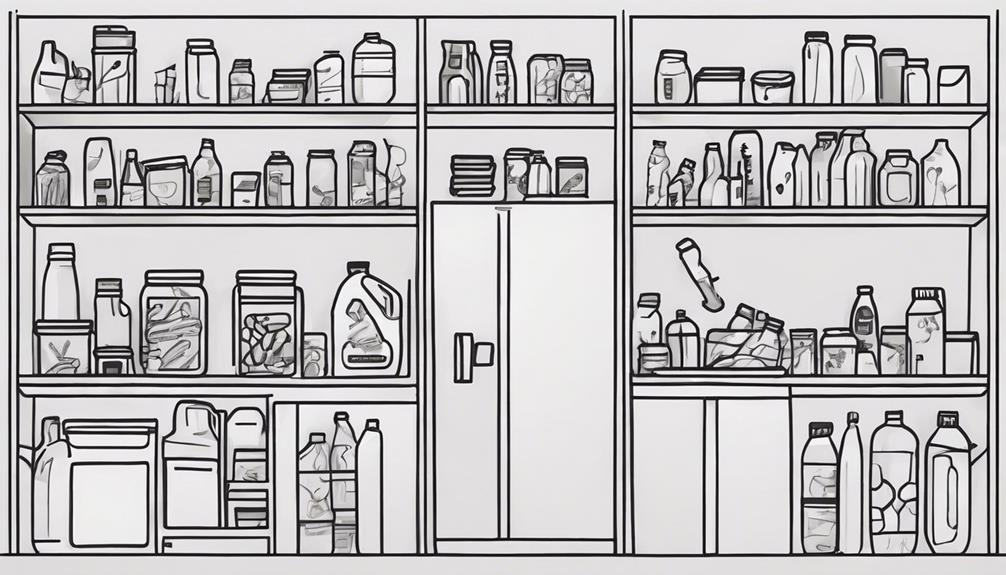
Household items suitable for recycling encompass a variety of materials commonly found in everyday use, including aluminum cans, glass bottles, plastic containers, paper, and cardboard products. Recycling these items is crucial for reducing waste sent to landfills and conserving natural resources. Aluminum cans, for instance, can be recycled infinitely without losing quality, saving energy with each cycle. Recycling plastic containers plays a significant role in reducing plastic pollution and conserving fossil fuels. Moreover, paper and cardboard recycling helps prevent deforestation and reduces greenhouse gas emissions. To highlight the importance of recycling these household items, a table is provided below showcasing the benefits and impact of recycling glass, aluminum cans, and plastic containers.
| Material | Benefits | Impact |
|---|---|---|
| Glass | Infinitely recyclable, reduces energy consumption | Reduces landfill waste |
| Aluminum Cans | Energy-saving, high recycling rate | Decreases resource depletion |
| Plastic Containers | Reduces plastic pollution, conserves resources | Minimizes environmental harm |
Process of Recycling Materials
The process of recycling materials involves systematic steps from collection to remanufacturing, aiming to efficiently utilize resources and reduce environmental impact. Understanding the efficient recycling of materials contributes to the numerous environmental benefits associated with the practice, such as reduced waste generation and conservation of natural resources. Implementing proper recycling processes is crucial for sustainable waste management and mitigating the depletion of valuable resources.
Materials Recycled Efficiently
Efficient recycling of materials plays a crucial role in conserving energy and natural resources while reducing the environmental impact of manufacturing processes. Here are some key points highlighting the importance of recycling materials efficiently:
- Recycling aluminum saves 95% of the energy needed to make new aluminum products.
- Glass can be recycled indefinitely without losing quality or purity.
- Paper can be recycled multiple times before it needs to be repurposed.
- Different types of plastics have varying recyclability, with PET plastic being widely recyclable.
Environmental Benefits of Recycling
Recycling materials not only aids in reducing waste sent to landfills and incinerators but also plays a crucial role in protecting ecosystems and wildlife through the conservation of natural resources. By reusing materials, recycling helps reduce greenhouse gases, contributing to environmental protection efforts. The process of recycling promotes resource conservation, energy efficiency, and overall sustainability practices. Below is a table illustrating the environmental benefits of recycling:
| Environmental Benefits of Recycling | |
|---|---|
| Reduces waste from landfill | Protects ecosystems |
| Conserves natural resources | Lowers carbon emissions |
| Decreases need to harvest new materials | Makes a difference |
Recycling is a vital practice that not only minimizes waste but also positively impacts the environment by conserving resources and reducing pollution.
Promoting Recycling in Communities
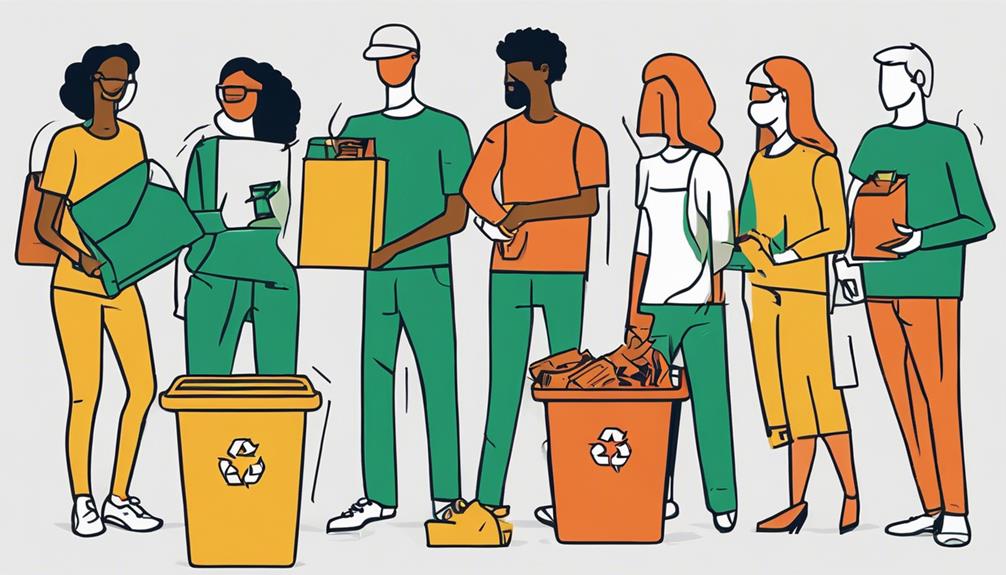
Promoting sustainable waste management practices in communities can significantly impact environmental conservation efforts. When communities actively participate in recycling programs, they contribute to the creation of a more sustainable environment. Here are some key ways in which promoting recycling in communities can benefit the environment:
- Reduction of Waste: By promoting recycling, communities can significantly reduce the amount of waste that ends up in landfills, leading to a more efficient use of resources.
- Conservation of Natural Resources: Recycling helps conserve precious natural resources such as timber and water, which are essential for maintaining ecological balance.
- Lower Pollution Levels: Engaging in recycling practices at a local level can help lower pollution levels and decrease greenhouse gas emissions, contributing to cleaner air and water.
- Job Creation: Recycling initiatives in communities support the creation of jobs in the recycling and manufacturing sectors, contributing to economic growth while benefiting the environment.
Spreading Awareness About Recycling
Spreading awareness about the benefits and importance of responsible waste management practices, particularly recycling, is crucial for fostering a sustainable environment and reducing the impact of waste on ecosystems. By educating individuals about the significance of recycling, we can significantly reduce the amount of waste sent to landfills, ultimately promoting efficient waste management. Furthermore, increasing knowledge about recycling not only encourages active participation in recycling programs but also plays a vital role in conserving natural resources. This, in turn, helps minimize the energy consumption associated with producing new materials, contributing to a more sustainable future.
| Benefits of Spreading Awareness About Recycling |
|---|
| Reduces waste sent to landfills |
| Increases participation in recycling programs |
| Conserves natural resources |
Raising awareness about recycling is essential as it encourages individuals to adopt eco-friendly habits, fostering a cleaner and healthier community for generations to come. Moreover, sharing information about recycling statistics and environmental impacts can motivate people to take action towards preserving the planet through recycling initiatives.
Frequently Asked Questions
What Are 3 Reasons Why Recycling Is Important?
Recycling is essential due to its environmental impact, resource conservation, and waste reduction benefits. It minimizes the need for landfill space, decreases pollution from extracting raw materials, and saves energy, reducing greenhouse gas emissions. By transforming waste into valuable commodities, recycling optimizes limited natural resources, aiding in the mitigation of climate change. Embracing recycling practices is crucial for a sustainable future, promoting a cleaner environment and a more efficient use of resources.
What Are 5 Benefits of Recycling?
Recycling offers numerous benefits, including environmental impact mitigation through waste reduction and energy conservation. It promotes resource conservation by reusing materials, significantly lowering production costs and decreasing greenhouse gas emissions. Sustainable practices are encouraged through recycling initiatives, fostering community involvement and a sense of responsibility towards preserving the environment. Embracing recycling not only supports cost savings but also plays a vital role in fostering a more sustainable future for all.
Why Is Recycling of Matter Important?
Resource conservation through recycling is vital for environmental sustainability. By reusing materials, waste is reduced, leading to significant energy savings and pollution prevention. This practice supports a circular economy by extending the lifespan of resources. Recycling plays a crucial role in optimizing natural resources and promoting sustainable resource management. Embracing recycling practices is essential for preserving our planet for future generations.
What Will Happen if We Don't Recycle?
If we don't recycle, the environmental impact will be severe. Without proper waste management through recycling, landfills will overflow, leading to increased pollution and greenhouse gas emissions. Natural resources will be depleted at an accelerated rate, and the energy and resources required for extraction and production will rise. Conservation of resources through recycling is crucial to mitigate these negative effects and maintain environmental sustainability for future generations.
Conclusion
In conclusion, recycling plays a crucial role in mitigating environmental degradation, conserving resources, and promoting sustainability. By participating in recycling efforts, individuals can contribute to a more sustainable future and help protect the planet for future generations. It is imperative that we continue to prioritize recycling as a means to address the challenges of waste management and resource depletion in a responsible and efficient manner.
